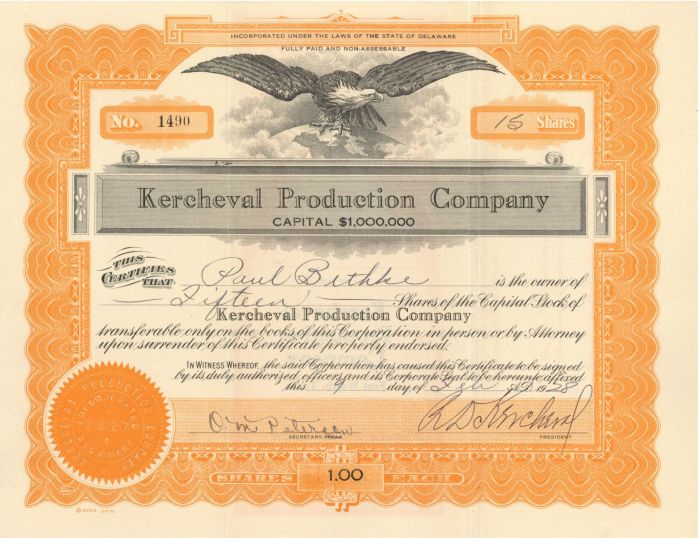Kercheval Production Co. - Relating to Mail Fraud - Stock Certificate
Inv# OS1688 Stock
Stock printed by Goes. From casetext.com:
Kercheval v. United States
Opinion
No. 5700.
January 6, 1930. Rehearing Denied February 6, 1930.
Appeal from the District Court of the United States for the Northern District of Texas; Robert T. Ervin, Judge.
Robert D. Kercheval was convicted of using the mails in furtherance of a scheme to defraud, and he appeals. Affirmed.
Herbert C. Wade, of Fort Worth, Tex. (S.J. Callaway, of Fort Worth, Tex., on the brief), for appellant.
Fred Horowitz, Sp. Asst. Atty. Gen., and Norman A. Dodge, U.S. Atty., of Fort Worth, Tex. (Alex M. Mood, Asst. U.S. Atty., of Fort Worth, Tex., on the brief), for the United States.
Before BRYAN and FOSTER, Circuit Judges, and DAWKINS, District Judge.
FOSTER, Circuit Judge.
Appellant was convicted on an indictment charging him and one Slentz with using the mails in furtherance of a scheme to defraud. Error is assigned to the overruling of a motion for a directed verdict, on the ground of a fatal variance between the allegations of the indictment and the proof.
The indictment substantially alleges a scheme by which appellant and his codefendant were to sell shares and interests in certain designated oil and gas leases by false representation that they were of great present and prospective value and that the said defendants were the managers and promoters in good faith of such enterprises, which promises were to be made under their own names and under the names of the Kercheval Production Company and the Kercheval Production Company, Inc. The various letters and other documents sent through the mails are set out in extenso in the counts relating to them, and show that what was offered to the public were shares of stock in, and bonds issued by, the Kercheval Production Company; most of the letters being signed also by the name of R.D. Kercheval.
It is contended that the proof tended to show a scheme to sell shares of stock in the Kercheval Production Company, a trust estate, and the Kercheval Production Company, a corporation, whereas the indictment charged a scheme to sell shares and interests in certain designated properties.
There was sufficient evidence to show the fraudulent character of the scheme and the mailing of the letters, and that the leases described in the indictment were held out to the public as being owned by one or the other of the Kercheval companies.
The mailing of the letters constituted the offense, and it is impossible that the defendant could have been prejudiced in his defense in that regard. And undoubtedly the conviction in this case is a bar to any future prosecution for mailing the same documents. There is small difference between charging a scheme to sell an interest in certain property and proving the sale of shares of stock in corporations pretending to own the said property. Doubtless the average stockholder believes himself to be the owner of his share of the property of the corporation, overlooking the technical legal difference. The rule as to variance is stated by Wharton as follows: "Variance in criminal law is not now regarded as material, unless it is of such a substantive character as to mislead the accused in preparing his defense, or places him in a second jeopardy for the same offense." Wharton's Criminal Evidence (10th Ed.) p. 276.
In general, the rules of evidence in criminal and civil cases are the same. United States v. Gooding, 12 Wheat. 469, 6 L. Ed. 693. The above-stated rule is supported by the following authorities: Nash v. Towne, 5 Wall. 689, 18 L. Ed. 527; Washington, etc., Railroad Co. v. Hickey, 166 U.S. 521, 17 S. Ct. 661, 41 L. Ed. 1101; Pope v. Allis, 115 U.S. 363, 6 S. Ct. 69, 29 L. Ed. 393; Standard Oil Co. v. Brown, 218 U.S. 78, 30 S. Ct. 669, 54 L. Ed. 939; Fuller Co. v. McCloskey, 228 U.S. 194, 33 S. Ct. 471, 57 L. Ed. 795.
Furthermore, under the provisions of the Act of February 26, 1919 (28 USCA § 391), errors that do not affect the substantial rights of the parties are to be disregarded. As applied to the question of variance, see West v. United States (C.C.A.) 258 F. 413; Kalin v. United States (C.C.A.) 2 F.2d 58; Mansolilli v. United States (C.C.A.) 2 F.2d 42; Beavers v. United States (C.C.A.) 3 F.2d 860; Meyers v. United States (C.C.A.) 3 F.2d 379.
Other errors assigned need not be reviewed, as they are without merit. The record presents no reversible error. (From casetext.com)
A stock certificate is issued by businesses, usually companies. A stock is part of the permanent finance of a business. Normally, they are never repaid, and the investor can recover his/her money only by selling to another investor. Most stocks, or also called shares, earn dividends, at the business's discretion, depending on how well it has traded. A stockholder or shareholder is a part-owner of the business that issued the stock certificates.










Ebay ID: labarre_galleries